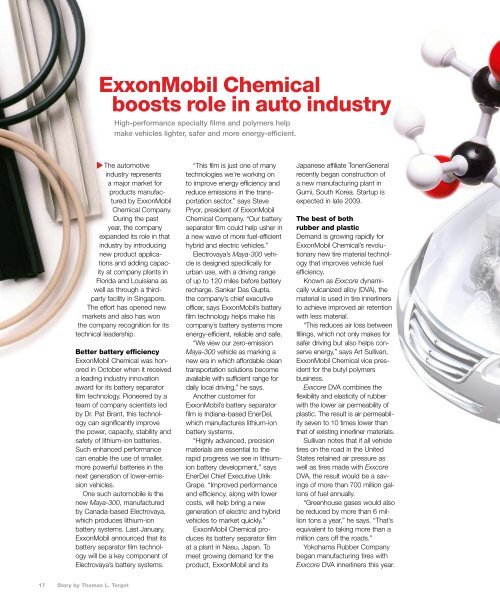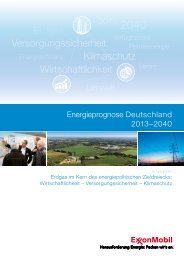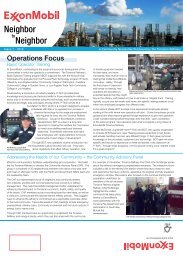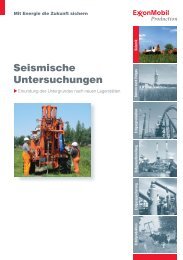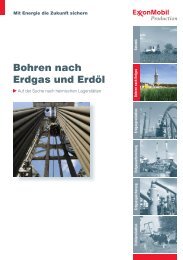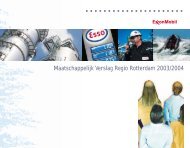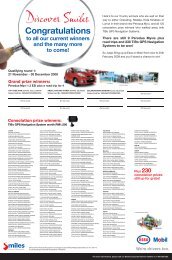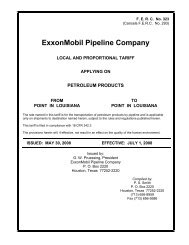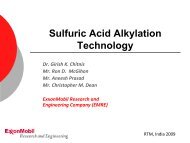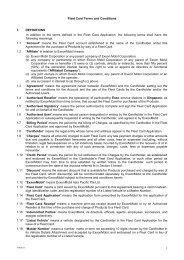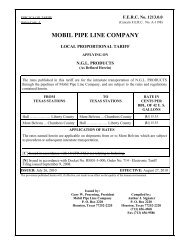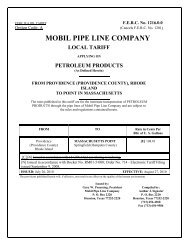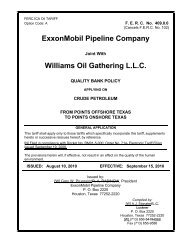Number 4 - ExxonMobil in the UK
Number 4 - ExxonMobil in the UK
Number 4 - ExxonMobil in the UK
Create successful ePaper yourself
Turn your PDF publications into a flip-book with our unique Google optimized e-Paper software.
17<br />
The automotive<br />
<strong>in</strong>dustry represents<br />
a major market for<br />
products manufactured<br />
by <strong>ExxonMobil</strong><br />
Chemical Company.<br />
Dur<strong>in</strong>g <strong>the</strong> past<br />
year, <strong>the</strong> company<br />
expanded its role <strong>in</strong> that<br />
<strong>in</strong>dustry by <strong>in</strong>troduc<strong>in</strong>g<br />
new product applications<br />
and add<strong>in</strong>g capacity<br />
at company plants <strong>in</strong><br />
Florida and Louisiana as<br />
well as through a thirdparty<br />
facility <strong>in</strong> S<strong>in</strong>gapore.<br />
The effort has opened new<br />
markets and also has won<br />
<strong>the</strong> company recognition for its<br />
technical leadership.<br />
Better battery efficiency<br />
<strong>ExxonMobil</strong> Chemical was honored<br />
<strong>in</strong> October when it received<br />
a lead<strong>in</strong>g <strong>in</strong>dustry <strong>in</strong>novation<br />
award for its battery separator<br />
film technology. Pioneered by a<br />
team of company scientists led<br />
by Dr. Pat Brant, this technology<br />
can significantly improve<br />
<strong>the</strong> power, capacity, stability and<br />
safety of lithium-ion batteries.<br />
Such enhanced performance<br />
can enable <strong>the</strong> use of smaller,<br />
more powerful batteries <strong>in</strong> <strong>the</strong><br />
next generation of lower-emission<br />
vehicles.<br />
One such automobile is <strong>the</strong><br />
new Maya-300, manufactured<br />
by Canada-based Electrovaya,<br />
which produces lithium-ion<br />
battery systems. Last January,<br />
<strong>ExxonMobil</strong> announced that its<br />
battery separator film technology<br />
will be a key component of<br />
Electrovaya’s battery systems.<br />
Story by Thomas L. Torget<br />
<strong>ExxonMobil</strong> Chemical<br />
boosts role <strong>in</strong> auto <strong>in</strong>dustry<br />
High-performance specialty films and polymers help<br />
make vehicles lighter, safer and more energy-efficient.<br />
“This film is just one of many<br />
technologies we’re work<strong>in</strong>g on<br />
to improve energy efficiency and<br />
reduce emissions <strong>in</strong> <strong>the</strong> transportation<br />
sector,” says Steve<br />
Pryor, president of <strong>ExxonMobil</strong><br />
Chemical Company. “Our battery<br />
separator film could help usher <strong>in</strong><br />
a new wave of more fuel-efficient<br />
hybrid and electric vehicles.”<br />
Electrovaya’s Maya-300 vehicle<br />
is designed specifically for<br />
urban use, with a driv<strong>in</strong>g range<br />
of up to 120 miles before battery<br />
recharge. Sankar Das Gupta,<br />
<strong>the</strong> company’s chief executive<br />
officer, says <strong>ExxonMobil</strong>’s battery<br />
film technology helps make his<br />
company’s battery systems more<br />
energy-efficient, reliable and safe.<br />
“We view our zero-emission<br />
Maya-300 vehicle as mark<strong>in</strong>g a<br />
new era <strong>in</strong> which affordable clean<br />
transportation solutions become<br />
available with sufficient range for<br />
daily local driv<strong>in</strong>g,” he says.<br />
Ano<strong>the</strong>r customer for<br />
<strong>ExxonMobil</strong>’s battery separator<br />
film is Indiana-based EnerDel,<br />
which manufactures lithium-ion<br />
battery systems.<br />
“Highly advanced, precision<br />
materials are essential to <strong>the</strong><br />
rapid progress we see <strong>in</strong> lithiumion<br />
battery development,” says<br />
EnerDel Chief Executive Ulrik<br />
Grape. “Improved performance<br />
and efficiency, along with lower<br />
costs, will help br<strong>in</strong>g a new<br />
generation of electric and hybrid<br />
vehicles to market quickly.”<br />
<strong>ExxonMobil</strong> Chemical produces<br />
its battery separator film<br />
at a plant <strong>in</strong> Nasu, Japan. To<br />
meet grow<strong>in</strong>g demand for <strong>the</strong><br />
product, <strong>ExxonMobil</strong> and its<br />
Japanese affiliate TonenGeneral<br />
recently began construction of<br />
a new manufactur<strong>in</strong>g plant <strong>in</strong><br />
Gumi, South Korea. Startup is<br />
expected <strong>in</strong> late 2009.<br />
The best of both<br />
rubber and plastic<br />
Demand is grow<strong>in</strong>g rapidly for<br />
<strong>ExxonMobil</strong> Chemical’s revolutionary<br />
new tire material technology<br />
that improves vehicle fuel<br />
efficiency.<br />
Known as Exxcore dynamically<br />
vulcanized alloy (DVA), <strong>the</strong><br />
material is used <strong>in</strong> tire <strong>in</strong>nerl<strong>in</strong>ers<br />
to achieve improved air retention<br />
with less material.<br />
“This reduces air loss between<br />
fill<strong>in</strong>gs, which not only makes for<br />
safer driv<strong>in</strong>g but also helps conserve<br />
energy,” says Art Sullivan,<br />
<strong>ExxonMobil</strong> Chemical vice president<br />
for <strong>the</strong> butyl polymers<br />
bus<strong>in</strong>ess.<br />
Exxcore DVA comb<strong>in</strong>es <strong>the</strong><br />
flexibility and elasticity of rubber<br />
with <strong>the</strong> lower air permeability of<br />
plastic. The result is air permeability<br />
seven to 10 times lower than<br />
that of exist<strong>in</strong>g <strong>in</strong>nerl<strong>in</strong>er materials.<br />
Sullivan notes that if all vehicle<br />
tires on <strong>the</strong> road <strong>in</strong> <strong>the</strong> United<br />
States reta<strong>in</strong>ed air pressure as<br />
well as tires made with Exxcore<br />
DVA, <strong>the</strong> result would be a sav<strong>in</strong>gs<br />
of more than 700 million gallons<br />
of fuel annually.<br />
“Greenhouse gases would also<br />
be reduced by more than 6 million<br />
tons a year,” he says. “That’s<br />
equivalent to tak<strong>in</strong>g more than a<br />
million cars off <strong>the</strong> roads.”<br />
Yokohama Rubber Company<br />
began manufactur<strong>in</strong>g tires with<br />
Exxcore DVA <strong>in</strong>nerl<strong>in</strong>ers this year.


